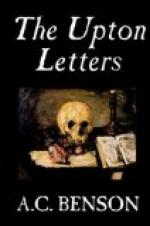And I am glad that even so Shakespeare could be silent, and buy and sell, and go in and out among his fellow-townsmen, and make merry. That is better than to sit arid and prosperous, when the brain stiffens with stupor, and the hand has lost its cunning, and to read old newspaper-cuttings, and long for adequate recognition. God give me and all uneasy natures grace to know when to hold our tongues; and to take the days that remain with patience and wonder and tenderness; not making haste to depart, but yet not fearing the shadow out of which we come and into which we must go; to live wisely and bravely and sweetly, and to close our eyes in faith, with a happy sigh, like a child after a long summer day of life and delight.—Ever yours,
T. B.
The blue boar,
Stanton Hardwick,
April 25, 1904.
Dear Herbert,—Since I last wrote I have been making pious pilgrimages to some of the great churches hereabouts: to Gloucester, Worcester, Tewkesbury, Malvern, Pershore. It does me good to see these great poems in stone, beautiful in their first conception, and infinitely more beautiful from the mellowing influences of age, and from the human tradition that is woven into them and through them. There are few greater pleasures than to make one’s way into a Cathedral city, with the grey towers visible for miles across the plain, rising high above the house roofs and the smoke. At first one is in the quiet country; then the roads begin to have a suburban air—new cottages rise by the wayside, comfortable houses, among shrubberies and plantations. Then the street begins; the houses grow taller and closer, and one has a glimpse of some stately Georgian front, with pediment and cornice; perhaps there is a cluster of factories, high, rattling buildings overtopped by a tall chimney, with dusty, mysterious gear, of which one cannot guess the purport, travelling upwards into some tall, blank orifice. Then suddenly




